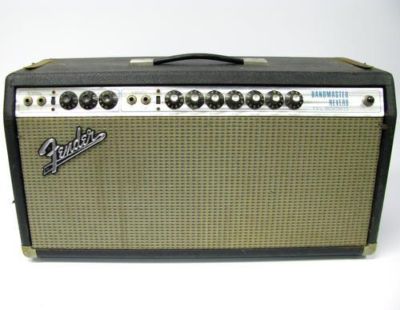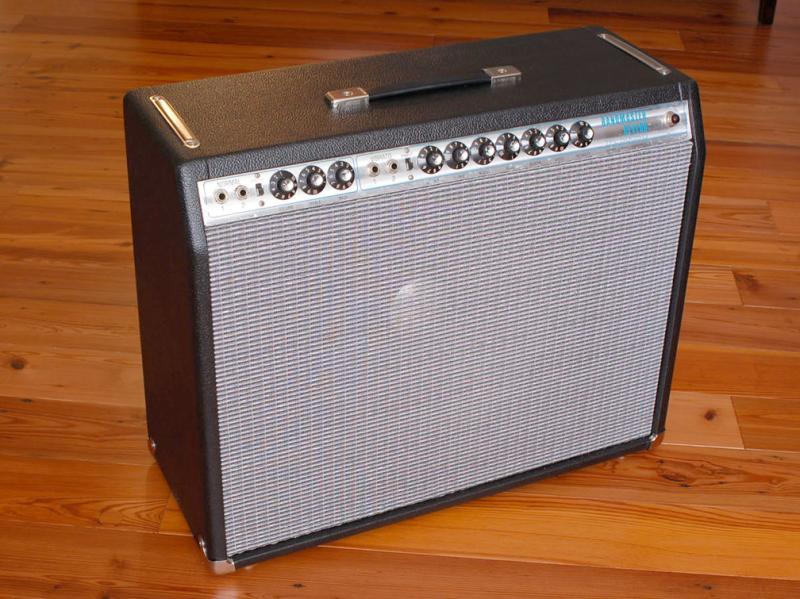Your Cart is Empty
NOW FREE SHIPPING TO 48 CONTIGUOUS UNITED STATES ON ALL ORDERS!!!
A Little Love for the Fender Bandmaster Reverb
by vaughn skow June 18, 2013 3 min read
 The Bandmasters,
like most of the classic Fender amp models have existed for decades, and have went
through several metamorphoses in their lengthy lifespan. From very early tweed models with a single 15
or a trio of 10’s, the short lived (1960 only) brown combo, the fabled blond,
brown, and blackface “piggy-back” heads of the 1960’s, and finally the
silver-face models that began in 1967 and ran through the early 1970’s. Although these amps run the gamut tone-wise ,
they all are fairly universally loved.
From the super-woody raw no negative feedback sound of the early tweed
models to the quintessential tight sparkly
blackface tone of the blackface Bandmasters, there’s a whole lotta love in the Bandmaster
fan club. But, this blog is about the
one member of the Bandmaster family that sometimes goes unloved: The
silver-faced Bandmaster Reverb. Okay, there is the new Bandmaster VM, but that’s
not even on my radar as far as a Bandmaster goes. With digital signal processing, Chinese PC
board construction, etc. and so on … that’s most decidedly NOT a Bandmaster in
my book.
The Bandmasters,
like most of the classic Fender amp models have existed for decades, and have went
through several metamorphoses in their lengthy lifespan. From very early tweed models with a single 15
or a trio of 10’s, the short lived (1960 only) brown combo, the fabled blond,
brown, and blackface “piggy-back” heads of the 1960’s, and finally the
silver-face models that began in 1967 and ran through the early 1970’s. Although these amps run the gamut tone-wise ,
they all are fairly universally loved.
From the super-woody raw no negative feedback sound of the early tweed
models to the quintessential tight sparkly
blackface tone of the blackface Bandmasters, there’s a whole lotta love in the Bandmaster
fan club. But, this blog is about the
one member of the Bandmaster family that sometimes goes unloved: The
silver-faced Bandmaster Reverb. Okay, there is the new Bandmaster VM, but that’s
not even on my radar as far as a Bandmaster goes. With digital signal processing, Chinese PC
board construction, etc. and so on … that’s most decidedly NOT a Bandmaster in
my book.
Okay, so let’s talk Bandmaster Reverb. The 1968 Bandmaster Reverb bears the unfortunate title of being the first of the new CBS enhanced models. I just finished reading Forrest White’s book: The Fender Inside Story. In this book Forrest mentions that the head engineer that CBS brought in to REPLACE Leo Fender (who had volunteered to stay on) was a real big name electronic engineer, but didn’t know a guitar amp from a toilet seat! (My terminology, not Mr. Whites.) And so it is that while every other aluminum drip edge Fender from that time period is considered a real gem … basically a blackface amp with silver-face cosmetics, the Bandmaster Reverbs from that period have a reputation of sounding a little more like a toilet seat than a blackface Fender!
But, my friends, there IS a silver lining to all this talk of toilet seats! Let me point it out. The undesirable changes to the Bandmaster Reverb really were not a big deal at all, and a good amp tech can put it back to true blackface specs in very short order and for very little cost. The changes for the most part are in the bias circuit and a few component values here and there. Another concern some point out is that the Bandmaster Reverb had a pretty small output transformer compared to the (non-reverb) Bandmaster. This last item may actually be a PLUS to some, because just like with the small OP tranny in ablackface Vibrolux Reverb, the Bandmaster Reverb’s small tranny makes for nice early-onset saturation. There is one “new” feature of the Bandmaster Reverb sure to please most Fender Fans: the Bandmaster Reverb re-introduced a little something to the Bandmaster that had been gone for a long, long time: a TUBE rectifier. Yep, it was back-to-the-future for the Bandmaster Reverb! And hey, what REAL Fender Ampaholic DOESN’T like tube rectification?
Okay, so what do you get when you take a classic blackface fender design with Tremolo AND Reverb, based around a tube-rectified 2-6L6 power section? Well, let’s think about that …
With the stock (small) Output Transformer into a pair of 10” speakers, you get a blackface Vibrolux Reverb.
With a larger aftermarket transformer with multiple impedance taps feeding a quad of 10’s you get a blackface Super Reverb.
And with that larger transformer feeding a 15, you get a Vibroverb! Quite a number of Bandmaster Reverbs have went this route, commonly called “Vibroclones”. Like THIS sexy example:

Since it just happens that I have several Bandmaster heads, I decided to do a little shootout between my blackface Bandmaster and my drip-edge Bandmaster Reverb, which has been “Blackfaced” and has the larger output transformer. Ya all let me know what ya think. WARNING: this one has a bit of my usual silliness, just sayin'...
See ya all next week!
Leave a comment
Comments will be approved before showing up.
